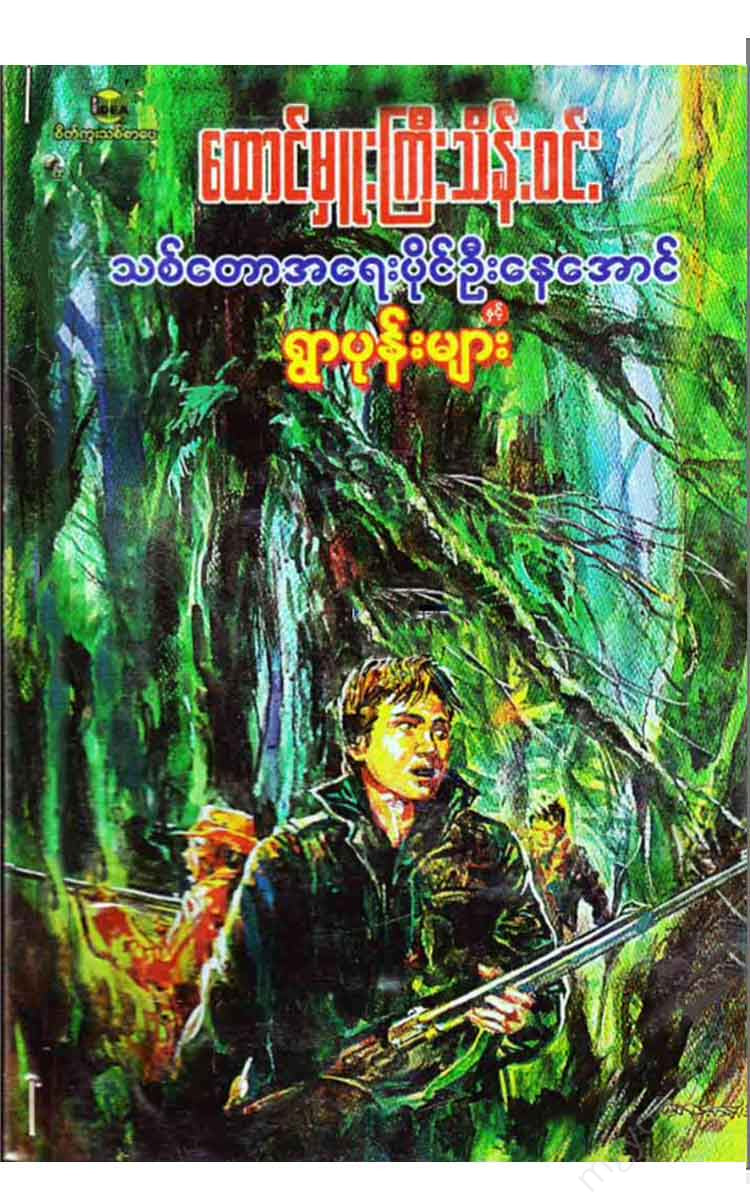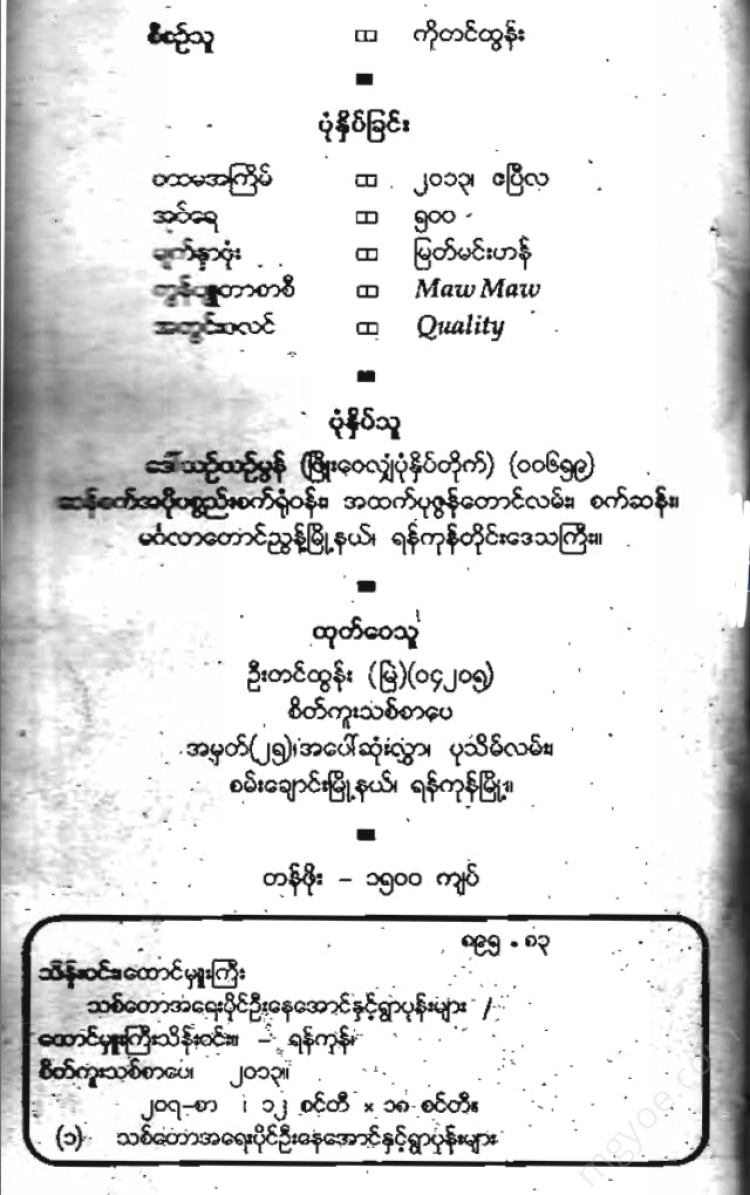Other Websites
Prison Chief Thein Win - Forestry Minister U Nay Aung and the Villagers
Prison Chief Thein Win - Forestry Minister U Nay Aung and the Villagers
Couldn't load pickup availability
Chapter (1)
I, U Nay Aung, am a forest officer who was assigned to Sagaing Region during the pre-war and post-war periods and the early years of independence. I would like to share with you the true stories of the mysterious forest events I experienced during my time in the region. ', ... The area I govern is quite extensive. . It extends to Innaw, Bhanmauk, Phong Pyin, Tsangbu, Mawlayt, Kyunhla, Kalay Wa, and Tan Si townships.
I have to go on field inspections twice a month, so I spend almost a month in the forest. That's why I like the forest and mountain food, and I'm a hunter, so my work and passion are the same, so I don't complain even though I'm tired.
I have the same passion, the same personality, and many officers and employees of the Forest Department who love me for life. Among them, Forest Officer Zaw Min, Typist Kyaw Sein Win, and Driver Sin Sin Che Aung Bu are my students who met and taught me about forest rights.
After graduating with a degree in forestry from Yangon University, he began working in the Forestry Department as an assistant forester during the pre-war period, traveling around the forests of Sagaing Region.
Therefore, there are very few forests and forests that I have not visited. However, I must admit that there are “hidden villages” that I have not visited. “Hidden villages” are in a separate world that not everyone can reach. They mean villages that have disappeared.
When appointed as an employee in the Forest Department, only those who are healthy and physically strong are usually selected. In addition to forestry subjects, they are taught various courses such as shooting with various weapons, martial arts, swimming, and mountain climbing. . . . . . . .
In addition to learning how to classify wood types, mark trees with the appropriate size for felling, cut wood with skilled workers, haul wood with elephants and buffaloes, and build rafts to slide down. In addition, they also learn how to estimate the total cost of wood, calculate the cost of wood and wood chips, and catch wood thieves.
The biggest enemy of our forest workers is not wood thieves or wild animals, but malaria. There is no one who has not been sick. Only those who are not immune to malaria.
Some died in the forest or mountains, and their families were unable to come to pay their respects. Therefore, long-time forest workers are resilient despite their physical limitations.
I also had malaria when I was a deputy forest ranger. I got malaria despite taking my weekly anti-malarial medication regularly. People who don't take the vaccine often get malaria and have a high fever and can even be life-threatening.
If people take their medicine regularly, they will be cured of malaria. It is not life-threatening. In those days, there were no different types of malaria vaccines like now, and there was only one type of medicine, quinine, which is chloramphenicol. The vaccine is the same as the medicine for treatment. . .
To prevent it, take two quinine pills a week. If you get sick, you have to take four pills three times a day, each time, and your mouth will become sore and you won't even want to eat. If you don't eat, you will have palpitations, palpitations, blurred vision, and a long-lasting fever.
I have seen people who were so weak that they died while undergoing treatment, and people who went crazy because malaria had entered their brains. Therefore, the life of a forest worker who cannot avoid malaria is very pitiful.
It would be wrong to assume that malaria will not happen again because it is a major epidemic. Even if you live in the forest or mountains and take the vaccine, if you eat poorly, catch a cold, or sweat profusely, the deadly malaria that has been waiting for you will still come back.
When a disease strikes, neither a small nor a large person can survive. If medical treatment is not given as soon as possible, it can lead to madness and death. Therefore, in our forest, we are especially careful not to eat the wrong food, not to be bitten by mosquitoes, and not to catch a cold every day. - Throughout my thirty years of work, I have encountered, met, and separated from the impermanent cycle of the world through the method of the Pathāṭhāsamuppāta, which is very good. However, as an ordinary person who has not yet attained the Dhamma, he has to ride the long and varied cycle of life. He still has to fulfill his duties. I do not think it is too much to suggest that a person is someone who fulfills social duties until his death.
Our base camp is in Kyunhla Township. Normally, we inspect the forest areas twice a month. If an emergency occurs, we can go out to inspect the area at any time. Since we work in the mountains, emergencies can occur at any time and in any season.
It was an autumn day. An urgent telegram came in from Bhammauk. It reported that a person had been killed in a traffic accident at Phang Kha Hill Camp, Bhammauk District. Coincidentally, we were also preparing to travel to Bhammauk and Indawgyi.
Therefore, our group was able to travel quickly. We took a car from Kyun Hla, then a train to reach Bham Mauk via Kaw Lin and Wun Tho. From Bham Mauk, we took a large wooden truck to the Phang Kha Kone camp, which was the main camp, along the forest road. We arrived at Phang Kha Kone hut in the evening.
Phang Kha Kone camp is a camp with five logging trucks. The camp is in charge of the forest, U Khin Maung, and the vehicle driver, U Hla Thaung, and there are about 50 elephant heads, streamers, and loggers. As soon as we arrived, we were checked.
During the investigation, a Ford pickup truck hit a forest guard who was opening the gate to the camp at nightfall, damaging the gate. The driver, Hla Maung, had been driving the truck for only a few months, having been hired from Bhan Mauk.
I •••
“How long has it been since you arrived at the Phang Khakone camp, Maung Min?”
Driver Hla Maung...
"It's only been a little over a month, Your Majesty."
I... "Did you drive a wooden car while you were at Van Mauk Camp?"
“Yes, sir. I drive a truck that carries logs and sawn timber from the Intaw and Phang Khakone tree plantations to the railway via Bham Mauk.”
"How long have you been driving?"
“I come from the Katha side. I was there for (5) years, (3) years in Bham Mauk, and (1) month in this camp, so I have been driving for (8) years.”
"Have there ever been fatalities in car crashes before?"
"It's never happened, you know, buffalo fights and cow fights have happened before."
“Sir... do you drink alcohol?”
"I drink, sir, but I drink at night after work. I don't drink during work hours."
"Please explain the circumstances of the incident in full."
“Here you go ••• About a month ago, a villager who was traveling from the village near Thit Ya Pin camp in the car I was driving fell off the car in front of the Phang Kha Kone hut and died after being crushed by the rear wheel. -
That's why they changed the driver and asked me to drive this big truck from the Bhan Mauk camp. Our job was to transport logs from the Thit Ya Pin camp and Pin Nai Kone camp to Bhan Mauk.
If the rain is late, I can just park at this Phang Khakone camp and rest. This big car has a good engine, a good body, and it has a bad habit of breaking down at night. Drivers say among themselves that it is a big car with a ghost.
I...'
"They often break in at night. What do you mean they're haunted?"
"At night, the steering wheel of the car becomes so heavy that it can't turn, and it goes wherever it wants. At that time, a strong stench comes out of the back of the car and there is a loud noise. And the car doesn't have lights, which makes it worse."
“If the car lights don’t come on, report it to the driver. It’s not uncommon to drive through the forest at night without a good light. Check to see if the bulb is burnt out or the wire is broken. If the wire is broken, the driver can fix it himself. You guys are welcome. Now… tell me, how did it go that night?”
“It’s been about three or four days. I was returning from Thit Ya Pin camp to deliver logs to Bham Mauk when the rain started to fall. It was about 5 o’clock in the evening and at that time the car’s steering wheel felt very heavy and there was a strong smell coming from the back of the car. I was scared and locked the car but the engine didn’t stop and I crashed into the gate. I didn’t see the staff who opened the gate either, I only knew after I crashed. The brakes were bad and I couldn’t stop.”



